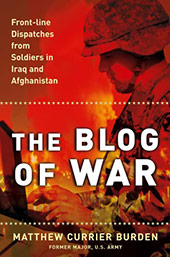intro | ch1 | ch2 | ch3 | ch4 | ch5 | ch6 | ch7 | ch8 | epilogue
Chapter 2
"Life in a War Zone"
Chapter 2 continues with soldiers’ and officers’ accounts of daily activity in the FOBs (Forward Operating Bases). In an attempt to describe day-to-day life in a war zone, Burden chooses blog excerpts for this chapter that detail the ways in which soldiers try to uphold the relatively stable and routinized work of FOB operations—activities as simple as morning exercises, gathering for meals, or off-duty recreation—in the midst of impending combat. These entries uniformly describe the anxiety of looming battles through descriptions of not-so-distant mortar fire and explosions. As Specialist Alex Barnes wrote, “…if I could hear it, it must be close…I had a strange thought that once that whoosh sound ended there would be an explosion and I could be in the middle of it….What made it frightening was the sense of impending doom, the foreknowledge and inevitability of the round’s trajectory” (p. 30). Equally explicit are the bloggers’ depictions of their mission duties working alongside Iraqi civilians. First Lieutenant Micah Bell, the operational “Mayor” of the Baghdad FOB, chronicles his experience firing a troublemaker employee, an Iraqi woman:
It took about five minutes of me talking to her through a translator before she realized I was firing her. Then the tears came. Ugh. I had 2 soldiers escort her to gather up her things, and then we all piled into a Humvee and drove out to one of the checkpoints. I collected her ID badges that let her into the International Zone and then we escorted her on foot through the checkpoint and out to the Red Zone.I had never fired anyone before. Even when I was a supervisor for a large security company in Chicago, I never fired anyone. This was weird. We just walked her out, took her ID cards and that was it. I felt like someone who drove out into the country and dropped of a pet they didn’t want anymore. (p. 40)
Collectively, these posts provide some insight into the ways in which soldiers cope with the reality of constant conflict.
